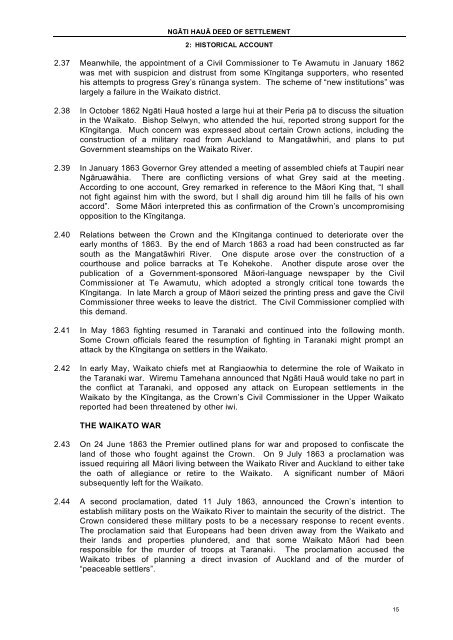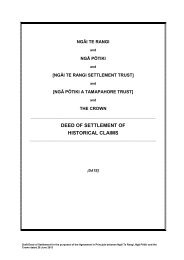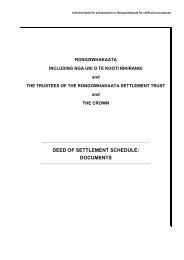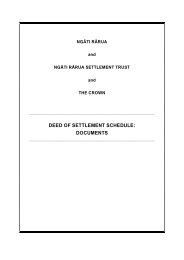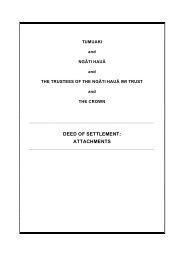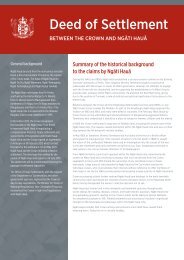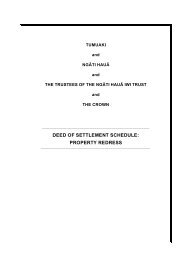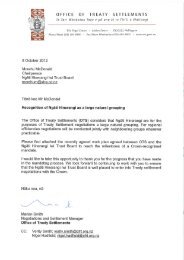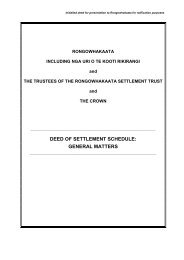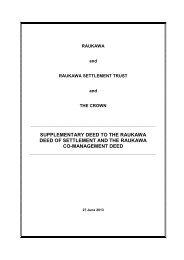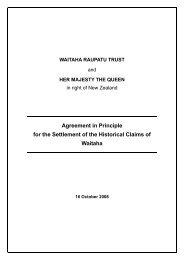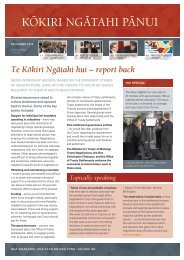Ngati Haua Deed of Settlement - Terabyte Interactive
Ngati Haua Deed of Settlement - Terabyte Interactive
Ngati Haua Deed of Settlement - Terabyte Interactive
You also want an ePaper? Increase the reach of your titles
YUMPU automatically turns print PDFs into web optimized ePapers that Google loves.
NGĀTI HAUĀ DEED OF SETTLEMENT2: HISTORICAL ACCOUNT2.37 Meanwhile, the appointment <strong>of</strong> a Civil Commissioner to Te Awamutu in January 1862was met with suspicion and distrust from some Kīngitanga supporters, who resentedhis attempts to progress Grey’s rūnanga system. The scheme <strong>of</strong> “new institutions” waslargely a failure in the Waikato district.2.38 In October 1862 Ngāti Hauā hosted a large hui at their Peria pā to discuss the situationin the Waikato. Bishop Selwyn, who attended the hui, reported strong support for theKīngitanga. Much concern was expressed about certain Crown actions, including theconstruction <strong>of</strong> a military road from Auckland to Mangatāwhiri, and plans to putGovernment steamships on the Waikato River.2.39 In January 1863 Governor Grey attended a meeting <strong>of</strong> assembled chiefs at Taupiri nearNgāruawāhia. There are conflicting versions <strong>of</strong> what Grey said at the meeting.According to one account, Grey remarked in reference to the Māori King that, “I shallnot fight against him with the sword, but I shall dig around him till he falls <strong>of</strong> his ownaccord”. Some Māori interpreted this as confirmation <strong>of</strong> the Crown’s uncompromisingopposition to the Kīngitanga.2.40 Relations between the Crown and the Kīngitanga continued to deteriorate over theearly months <strong>of</strong> 1863. By the end <strong>of</strong> March 1863 a road had been constructed as farsouth as the Mangatāwhiri River. One dispute arose over the construction <strong>of</strong> acourthouse and police barracks at Te Kohekohe. Another dispute arose over thepublication <strong>of</strong> a Government-sponsored Māori-language newspaper by the CivilCommissioner at Te Awamutu, which adopted a strongly critical tone towards theKīngitanga. In late March a group <strong>of</strong> Māori seized the printing press and gave the CivilCommissioner three weeks to leave the district. The Civil Commissioner complied withthis demand.2.41 In May 1863 fighting resumed in Taranaki and continued into the following month.Some Crown <strong>of</strong>ficials feared the resumption <strong>of</strong> fighting in Taranaki might prompt anattack by the Kīngitanga on settlers in the Waikato.2.42 In early May, Waikato chiefs met at Rangiaowhia to determine the role <strong>of</strong> Waikato inthe Taranaki war. Wiremu Tamehana announced that Ngāti Hauā would take no part inthe conflict at Taranaki, and opposed any attack on European settlements in theWaikato by the Kīngitanga, as the Crown’s Civil Commissioner in the Upper Waikatoreported had been threatened by other iwi.THE WAIKATO WAR2.43 On 24 June 1863 the Premier outlined plans for war and proposed to confiscate theland <strong>of</strong> those who fought against the Crown. On 9 July 1863 a proclamation wasissued requiring all Māori living between the Waikato River and Auckland to either takethe oath <strong>of</strong> allegiance or retire to the Waikato. A significant number <strong>of</strong> Māorisubsequently left for the Waikato.2.44 A second proclamation, dated 11 July 1863, announced the Crown’s intention toestablish military posts on the Waikato River to maintain the security <strong>of</strong> the district. TheCrown considered these military posts to be a necessary response to recent events .The proclamation said that Europeans had been driven away from the Waikato andtheir lands and properties plundered, and that some Waikato Māori had beenresponsible for the murder <strong>of</strong> troops at Taranaki. The proclamation accused theWaikato tribes <strong>of</strong> planning a direct invasion <strong>of</strong> Auckland and <strong>of</strong> the murder <strong>of</strong>“peaceable settlers”.15


